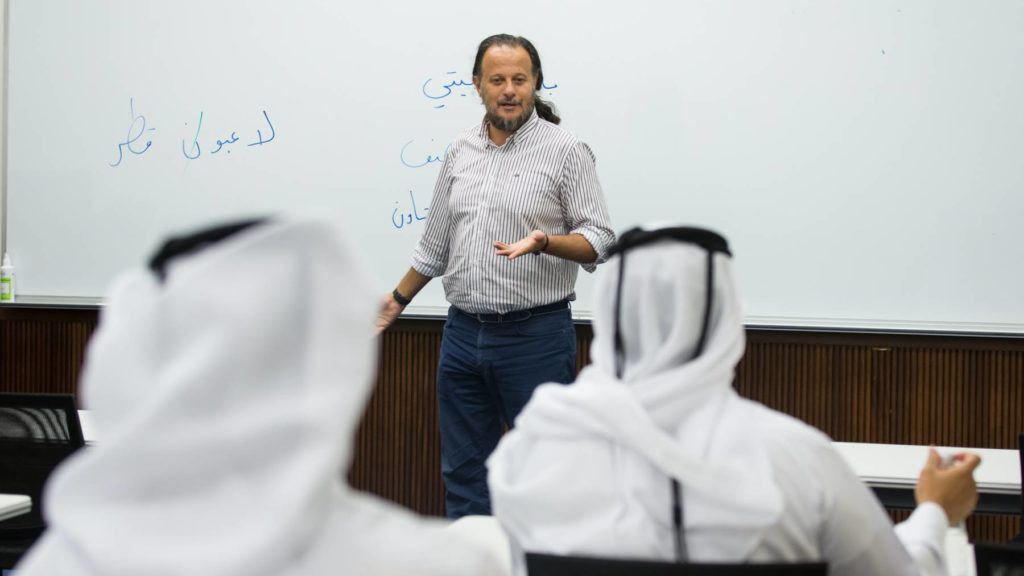Lego Play, Football, and Arabic Theatre: Georgetown’s Community Classes Make Learning Fun

People are often intimidated by the complexity and formality of the Arabic language, and that includes native speakers. But Abdul Rahman Chamseddine, a professor of Arabic at Georgetown University in Qatar (GU-Q), says students of the language have nothing to fear. And he’s teaching a class open to anyone who wants to improve their Arabic speaking skills to prove it. The course is called Formal Spoken Arabic, and it’s one of several engaging and educational skill-building classes the university is offering for the Fall 2019 installment of their popular Community Classes program starting this October.
“It’s true that the grammar of formal Arabic is complex, and it can be difficult,” he admits, but adds that “grammar is a separate science. It has nothing to do with comprehension or the four language skills: reading, writing, speaking, and listening.” He says the common misconception is due to the traditional approach to Arabic instruction, which promotes the study of grammar rules as the foundation of learning.
Instead, Dr. Chamseddine teaches language shortcuts that raise the level of spoken dialect to bridge the gap between the colloquial and the formal. With a lot of classroom exercises that use innovative teaching methods, such as working with theatrical scripts, he aims to give native speakers the skills to communicate in Arabic with confidence. “When it comes to public speaking, I want my students to be able to avoid the mistakes that can be caught by the listener.” His message to Arabic speakers who want to brush up their language is simple. “Don’t be afraid of grammar, which is for specialists. All you need is a practical language skill set.That’s the point of this course.”
Another Community Class on offer that challenges assumptions is “Destination 2022: Political Economy of Football.” Taught by Dr. Evren Tok, an assistant dean at HBKU, the course invites class participants to explore the politics, ethics and economics of football in a globalized world, with a special focus on Qatar. Dr. Tok will be using a combination of academic sources, popular articles, visuals, and group work to demonstrate how the sport is more than just a popular pastime. “Football now is a central pillar of Qatar’s soft power and national branding strategy. Moreover, football, as the Asian Cup illustrated, has played a role in connecting regional politics with global visions,” he explains.
One unique addition to his course will be the use of innovative tools of human centered design thinking such as Lego Serious Play, an open-source teaching tool that allows for creative thinking and communication through 3-dimensional modeling and storytelling. “Complexity of soft power mechanisms in today’s world is an important lesson,” he says, noting in particular that Qatar’s World Cup project has launched an expanding sphere of influence on domestic affairs. “Qatar is successfully anchoring larger macro visions and strategies through their investment in football,” he says, which includes reforming labor laws and diversifying the economy. Open now for registration, his course promises to teach one lesson in particular: “Football is more than just a game.”
Taught by a range of GU-Q faculty, staff, and industry experts, Community Classes are designed to fit the needs and schedules of professionals in Qatar. There are 11 different courses to choose from, and sessions include both Arabic and English language options. Classes will run for four weeks, starting the week of October 27, 2019 and ending the week of November 17, 2019, at the GU-Q campus in Education City. More information about the Community Classes is available online at http://qatar.georgetown.edu/cc